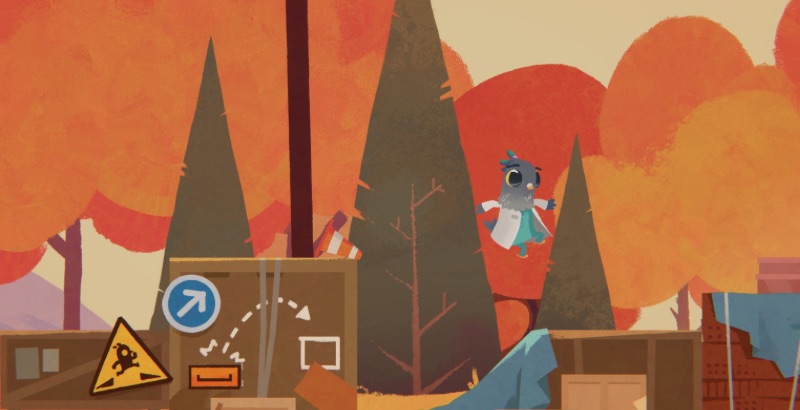
Video games have found interesting and unique ways to cover deep or impactful topics. From talking about what it’s like to deal with someone in the family having cancer to surviving a war as a civilian, the range of what a developer wants to cover is endless. Yet there’s been few that cover medicine and go to the root of the issue. Fall of Porcupine, by Critical Rabbit and Assemble Entertainment, is doing just that in their new adventure story about the healthcare system. They find ways to demonstrate how bad current healthcare is, even if the gameplay to get to that message fails to be most engaging.
Fall of Porcupine takes place in the Germanic-inspired village of Porcupine. All the citizens in this world are animals, and the town at the heart of the game is tight-knit. The hospital at the center of town is where Finley, a new doctor, recently got hired. As Finley, the player becomes part of this community as a wide-eyed, fresh-faced doctor, doing all they can to heal every patient you see. Finley quickly learns that there is more to the healthcare system than wanting to do what’s best for the patient and that you cannot save everyone. When money is an issue, the quality of healthcare drops, regardless of how passionate the medical staff is.
The minute-to-minute gameplay involves a lot of walking around and talking. The game feels like a visual novel at times and the intractability portions are welcoming. The town of Porcupine is fully explorable, and as you progress, it relies on your knowledge of the town for you to get around. Instead of having objective markers, you’re just told you need to go somewhere and find your way there. It’s a nice change of pace that adds to the feeling of being Finley in this new town that you’re slowly growing to be a member of. Plus, the world is fun to explore, the design offering distinct differences from a normal styled town that are accentuated by cartoonish, and hand-drawn art styles.
Some interactive moments add to the experience of being a doctor. Occasionally, Finley gets tasked to treat patients. This is played out by some simple mini-games. Like balancing out medications to get reading levels to the right level or playing Wordle with symbols to take notes/get a diagnosis. You get graded on how well you do, and as far as I can tell, these grades don’t add too much story-wise, instead playing like mindless busywork. These tasks grow monotonous as there are five mini-games that get cycled through, with the only difference being they get slightly more challenging as you progress.

The best gameplay moments can be found at times when you’re given a choice about how to spend an evening. Finely occasionally gets asked by two of his friends to go do something out on the town. This can involve, for example, helping a doctor prepare for a show or going out drinking with a nurse friend. They immediately turn into some genuinely fun moment, such as a bar fight that plays out like a turn-based battle or a murder mystery that involves asking actors questions to find out who did it.
These moments were surprising while able to develop more of the side characters. They show that these colleagues are actual people with their own lives, feelings, and interests. They also dive deeper into how a failing hospital is affecting them emotionally and physically. It all adds to a deepening compelling story.
Even for a simple game, there are several bugs. Some of which were game-breaking and required a restart. For instance, opening the menu occasionally caused the menu to remain on-screen and removed all functionality from the game. In another instance, Finley spoke in German even though he never did so before. Other times controls for the mini-games required several attempts for them to register as being completed. These never took away from the overall experience, but they do show that maybe this game needs a little more polish. With some patches, this could be a game to remember at the end of 2023.
Where Fall of Porcupine really shines is its story. The overall narrative of a hospital slowly falling into disarray leading to community distrust is strong as it details how the negligence of higher-ups in the name of money can and will lead to a worsening patient experience. This narrative is sorely needed and highlights the dangers as local hospitals, particularly in the US, are gobbled up by conglomerates and quickly become more and more profit-driven. Even with the US’s hate-hate relationship with insurance providers and a growing politicization of necessary medical treatments, our medical wherewithal is dropping quickly. A simplification of what this means, even if expedited or gamified, may be what people need to open their eyes to an ever-growing problem. In that regard, this game exceeds ten-fold on that front. Once the true issues begin to show in this game, it gets scary, hectic, and worst of all, real.
Fall of Porcupine isn’t a perfect game. Its minigames got repetitive quickly and had many odd bugs. But it does have heart and tells a fantastic story centered around our growing healthcare problem. It tells an important story about why modern healthcare is the way it is (in a cartoony package). It’s digestible and shows real-world risks if we don’t come together and demand change to a critically necessary service. As someone who is wholly engrained in the medical field since growing up in a family of doctors, it impacted me more than I expected. For creating a game that quickly has you caring about characters and this town, the developers deserve to be praised for doing what many could not.
Fall of Porcupine is available on Xbox One, Xbox Series X/S, PlayStation 4, PlayStation 5, Nintendo Switch, and PC
Fall of Porcupine
-
Rating - 7.5/107.5/10
TL;DR
Fall of Porcupine isn’t a perfect game. Its minigames got repetitive quickly and had many odd bugs. But it does have heart and tells a fantastic story centered around our growing healthcare problem.






